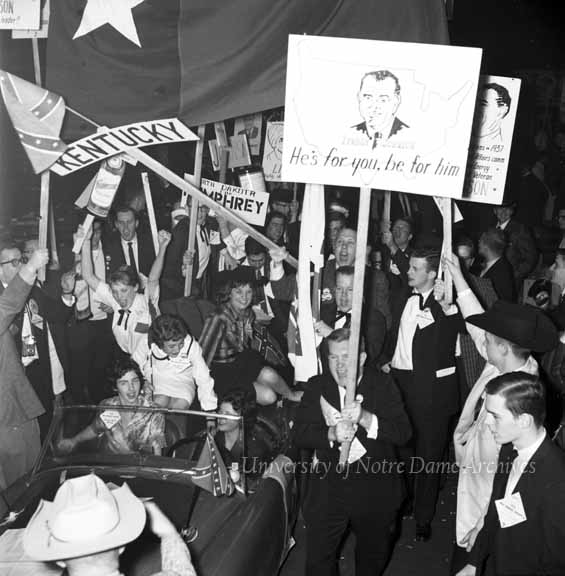
From 1932 until 1988, Notre Dame held mock political conventions every four years to pick a presidential candidate. The mock conventions were held before the national primaries had determined a presumptive candidate, which generated much excitement in the selection process among the Notre Dame and Saint Mary’s College student delegates. In a 1976 South Bend Tribune interview, Bill Mapother, the 1960 Chairman, recalled, “We practically closed down the damn University that week. The whole thing was covered on the campus radio.” The article continued, “[Mapother] claimed that the convention was ‘a hell of a lot of work,’ noting that the job actually started almost two and a half years before the scheduled date of the convention” [“The Notre Dame Mock Convention — Will This Year’s Be Accurate Too?” by Gerald Lutkus, South Bend Tribune, February 29, 1976].

The Law School organized a mock convention in 1932, and the Department of Political Science took the reigns in 1940. Post-World War II, the conventions quickly escalated to elaborate and often raucous three-day events. Students from all colleges participated and Notre Dame’s historically geographically diverse population allowed students to represent their home states. The addition of women from Saint Mary’s College in 1952 undoubtedly also added to the appeal of the event. Paul C. Bartholomew acted as faculty adviser until his death in 1975.
The Mock Conventions closely followed the format of the national conventions, from preparing platforms, voting for candidates, and securing high-profile speakers. The committee leaders often secured senators, representatives, governors, and mayors as speakers, including Chicago Mayor Richard Daley in 1960 and George W. Bush in 1980.

“The purpose of the Mock Convention is to provide students with an opportunity to work within the political nominating process in order that they might learn about our current political systems and parties. …
Also, the Mock Convention gives us, as students, the opportunity to speak out on pertinent issues (i.e. the party platform) and the viability of different candidates.”
[1972 Mock Democratic Convention flyer]

Cigars were a staple for the mock conventions.
Sources:
Scholastic
PNDP 71-Mo-01
GPHR 35m/06283
GPHR 45/2761
GNDS 26/22
See also:
“Echos: Mock political conventions at Notre Dame, 1940-1988,” by John Nagy, Notre Dame Magazine, Spring 2008
